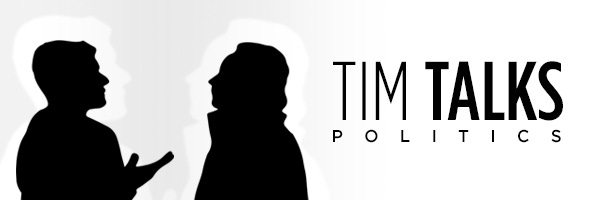Tim Talks Politics - The Weekly Brief, August 24, 2018

The Weekly Brief - August 24, 2018
“What we have here….”

In a shocking confirmation of general wisdom, Pew Research published survey results indicating that 80% of Americans believe that polarization in America is so bad Democrats and Republicans can't even agree on basic facts surrounding issues. This is quan
titative data supporting one of the most troubling aspects of polarization in the public square, and it is a big reason why this newsletter draws its sources from across the political spectrum. If basic facts cannot be agreed to, then one must read on both sides just to get full sense of what facts may be relevant. This also requires a certain degree of circumspection in talking with people, something The Art of Manliness provides a short primer on.
The Pew results might indicate that everybody's locked into their own camps, but Daily Signal suggests that the parties are actually in flux with Democrats leaving their party in noticeable numbers. The same is happening for Republicans, which means there's a growing body of voters labeling themselves as Independents.
The American Enterprise Institute looks at this phenomena and lays the blame on both Trump and Obama for appealing to the more radical elements of there bases and abandoning the political center. Though this might be a nice area of academic discussion there are some very real policy level effects of this kind of polarization of facts.
A perfect example is provided by a conservative publication Front Page Mag that argues California's historic level of wildfires this summer has less to do with climate change and more to do with poor environmental policy. However, if you were to read about California wildfires on left-leaning websites climate change is the dominant cause of the flames.
Definitely saw that coming
What a difference a week makes. Last Friday, Brookings Institute published a story entitled “Trump is Winning” that outlines the President's effective control of the media. And then Cohen and Manafort happened. The convictions of both Paul Manafort and Michael Cohen on tax fraud and other financial indiscretions have intensified the the pressure on Donald Trump and undercut his legitimacy.
By the end of this week, Brookings Institute was now outlining the case for Trump being impeached on obstruction of justice and suggesting that removing the president from office might not be a disruptive thing.
You might conclude that Brookings is merely a left-leaning publication that is out to get Trump at any cost, but FiveThirtyEight reports that talk of impeachment has peaked on the Republican side more than on the Democratic side.
The dominant narratives is the danger these convictions pose to president Trump and the future of his presidency, but this is an admittedly one-sided narrative. The Atlantic reports that Trump's base seems untroubled by these convictions as so many side shows while Pew Research reports that Trump's presidency is meeting and exceeding the low expectations that were set for it at its outset. This dynamic of a president who retains a loyal base and meets expectations, however low, could help explain what very well may become the counter narrative: Trump is a good president with a deeply flawed character.
Midterm muddle
Perhaps the most immediate political effect of the Cohen and Manafort (sounds like a couple of Broadway producers) convictions will be felt in the midterms. Democrats are at least hoping this will aid their efforts in taking back the House. Indeed, Pew Research reports that Democrats are significantly more active than Republicans in the field this summer.
Early projections indicate that this activity could accomplish the retaking of the House by the Democrats. However, FiveThirtyEight cautions against over optimism as Democrats taking the House, though likely, is still within a margin of error. In other words that “likely” could become “unlikely” very easily (just like the 2016 election if you’re Hillary Clinton). And if the economy continues to do well, that could make the difference for GOP incumbents in challenged districts.
The security of the midterms is also of concern, a fact underlined by instances of teenagers hacking elections. However, that’s an internal concern. The Russians are certain its not them.
Meanwhile...
News was focused on domestic political matters this week, but the world has its own troubles. To his credit, Secretary of State Mike Pompeo seems to be aware of the need for America to lead. The Council for Foreign Relations reports on his staffing of key positions in the State Department. It comes none too soon as trouble looms.
Rand Corp. reports on the growing risk of war in the Middle East even as Al-Monitor reports on a potential truce between Hamas and Israel.
Concerns continue across the political spectrum in America on the “dark turn” Pakistan is about to take under the leadership of Imran Khan.
Down in Africa, simmering civil strife in Cameroon threatens a larger conflict.
This is just a sampling of the conflicts and issues that America will need to negotiate in the coming couple of years that remain in a Trump administration. While it is certainly important that justice be done and laws upheld, it is equally important that our institutions not be so bogged down in that process as to miss these other events.
China: New friends and foes?
In terms of international concerns, China deserves its own category as it's continued geo-economic rise occurs as America becomes distracted by the above-mentioned domestic issues.
A bright spot for America is the presence of an equally large and ambitious neighbor. India is also looking to expand influence in the region which may be a good check on Chinese ambitions.
For its part, the Trump administration is not ignoring China (obviously), but much the attempts to limit China aren’t just happening on trade, but in places like Latin America.
Competing with China, however, is a tricky diplomatic gambit as it's massive size presents potential new markets for companies the world over. Asia Times reports that American allies like Europe and Japan are turning to China as a way to gain market access with the withdrawal of American imports.


